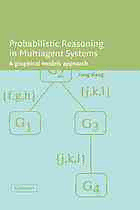
Probabilistic Reasoning in Multiagent Systems : A Graphical Models Approach PDF
Preview Probabilistic Reasoning in Multiagent Systems : A Graphical Models Approach
Probabilistic Reasoning in Multi-Agent Systems A graphical models approach Yang Xiang PROBABILISTIC REASONING IN MULTIAGENT SYSTEMS This book investigates the opportunities in building intelligent decision support systemsofferedbymultiagentdistributedprobabilisticreasoning. Probabilisticreasoningwithgraphicalmodels,alsoknownasBayesiannetworks orbeliefnetworks,hasbecomeanactivefieldofresearchandpracticeinartificial intelligence, operations research, and statistics in the past two decades. The suc- cess of this technique in modeling intelligent decision support systems under the centralizedandsingle-agentparadigmhasbeenstriking.Inthisbook,theauthorex- tendsgraphicaldependencemodelstothedistributedandmultiagentparadigm.He identifiesthemajortechnicalchallengesinvolvedinsuchanendeavorandpresents theresultsfromadecade’sresearch. The framework developed in the book allows distributed representation of un- certain knowledge on a large and complex environment embedded in multiple cooperativeagentsandeffective,exact,anddistributedprobabilisticinference. Yang Xiang is Associate Professor of Computing and Information Science at the University of Guelph, Canada, where he directs the Intelligent Decision Support SystemLaboratory.HereceivedhisPh.D.fromtheUniversityofBritishColumbia and developed the Java-based toolkit WebWeavr, which has been distributed to registeredusersinmorethan20countries.HealsoservesasPrincipalInvestigator intheInstituteofRoboticsandIntelligentSystems(IRIS),Canada. This Page Intentionally Left Blank PROBABILISTIC REASONING IN MULTIAGENT SYSTEMS A Graphical Models Approach YANG XIANG UniversityofGuelph PUBLISHED BY CAMBRIDGE UNIVERSITY PRESS (VIRTUAL PUBLISHING) FOR AND ON BEHALF OF THE PRESS SYNDICATE OF THE UNIVERSITY OF CAMBRIDGE The Pitt Building, Trumpington Street, Cambridge CB2 IRP 40 West 20th Street, New York, NY 10011-4211, USA 477 Williamstown Road, Port Melbourne, VIC 3207, Australia http://www.cambridge.org © Yang Xiang 2002 This edition © Yang Xiang 2003 First published in printed format 2002 A catalogue record for the original printed book is available from the British Library and from the Library of Congress Original ISBN 0 521 81308 5 hardback ISBN 0 511 02074 0 virtual (netLibrary Edition) Contents Preface pageix 1 Introduction 1 1.1 IntelligentAgents 1 1.2 ReasoningabouttheEnvironment 4 1.3 WhyUncertainReasoning? 5 1.4 MultiagentSystems 7 1.5 CooperativeMultiagentProbabilisticReasoning 11 1.6 ApplicationDomains 13 1.7 BibliographicalNotes 14 2 BayesianNetworks 16 2.1 GuidetoChapter2 16 2.2 BasicsonBayesianProbabilityTheory 19 2.3 BeliefUpdatingUsingJPD 23 2.4 Graphs 24 2.5 BayesianNetworks 27 2.6 LocalComputationandMessagePassing 30 2.7 MessagePassingoverMultipleNetworks 31 2.8 ApproximationwithMassiveMessagePassing 33 2.9 BibliographicalNotes 35 2.10 Exercises 36 3 BeliefUpdatingandClusterGraphs 37 3.1 GuidetoChapter3 38 3.2 ClusterGraphs 40 3.3 ConventionsforMessagePassinginClusterGraphs 43 3.4 Relationwithλ−π MessagePassing 44 3.5 MessagePassinginNondegenerateCycles 47 3.6 MessagePassinginDegenerateCycles 53 v vi Contents 3.7 JunctionTrees 56 3.8 BibliographicalNotes 59 3.9 Exercises 59 4 JunctionTreeRepresentation 61 4.1 GuidetoChapter4 62 4.2 GraphicalSeparation 64 4.3 SufficientMessageandIndependence 68 4.4 EncodingIndependenceinGraphs 69 4.5 JunctionTreesandChordalGraphs 71 4.6 TriangulationbyElimination 76 4.7 JunctionTreesasI-maps 78 4.8 JunctionTreeConstruction 80 4.9 BibliographicalNotes 83 4.10 Exercises 84 5 BeliefUpdatingwithJunctionTrees 86 5.1 GuidetoChapter5 86 5.2 AlgebraicPropertiesofPotentials 88 5.3 PotentialAssignmentinJunctionTrees 94 5.4 PassingBeliefoverSeparators 97 5.5 PassingBeliefthroughaJunctionTree 100 5.6 ProcessingObservations 104 5.7 BibliographicalNotes 105 5.8 Exercises 105 6 MultiplySectionedBayesianNetworks 107 6.1 GuidetoChapter6 108 6.2 TheTaskofDistributedUncertainReasoning 112 6.3 OrganizationofAgentsduringCommunication 117 6.4 AgentInterface 124 6.5 MultiagentDependenceStructure 128 6.6 MultiplySectionedBayesianNetworks 133 6.7 BibliographicalNotes 137 6.8 Exercises 140 7 LinkedJunctionForests 142 7.1 GuidetoChapter7 143 7.2 MultiagentDistributedCompilationofMSBNs 146 7.3 MultiagentMoralizationofMSDAG 147 7.4 EffectiveCommunicationUsingLinkageTrees 152 7.5 LinkageTreesasI-maps 155 7.6 MultiagentTriangulation 158 Contents vii 7.7 ConstructingLocalJunctionTreesandLinkageTrees 174 7.8 BibliographicalNotes 181 7.9 Exercises 181 8 DistributedMultiagentInference 182 8.1 GuidetoChapter8 183 8.2 PotentialsinaLinkedJunctionForest 186 8.3 LinkageTreesovertheSamed-sepset 190 8.4 ExtendedLinkagePotential 192 8.5 E-messagePassingbetweenAgents 194 8.6 MultiagentCommunication 196 8.7 TroubleshootingaDigitalSystem 201 8.8 ComplexityofMultiagentCommunication 207 8.9 RegionalMultiagentCommunication 208 8.10 AlternativeMethodsforMultiagentInference 209 8.11 BibliographicalNotes 212 8.12 Exercises 213 9 ModelConstructionandVerification 215 9.1 GuidetoChapter9 216 9.2 MultiagentMSBNSystemIntegration 217 9.3 VerificationofSubdomainDivision 219 9.4 AgentRegistration 221 9.5 DistributedVerificationofAcyclicity 223 9.6 VerificationofAgentInterface 237 9.7 ComplexityofCooperatived-sepsetTesting 271 9.8 BibliographicalNotes 272 9.9 Exercises 272 10 LookingintotheFuture 274 10.1 MultiagentReasoninginDynamicDomains 274 10.2 MultiagentDecisionMaking 277 10.3 WhatIfVerificationFails? 279 10.4 DynamicFormationofMSBNs 279 10.5 KnowledgeAdaptationandLearning 280 10.6 NegotiationoverAgentInterfaces 281 10.7 RelaxingHypertreeOrganization 283 10.8 ModelApproximation 284 10.9 MixedModels 285 10.10 BibliographicalNotes 285 Bibliography 287 Index 293 This Page Intentionally Left Blank Preface This book investigates opportunities for building intelligent decision support sys- tems offered by multiagent, distributed probabilistic reasoning. Probabilistic rea- soningwithgraphicalmodels,knownasBayesiannetworksorbeliefnetworks,has becomeanactivefieldofresearchandpracticeinartificialintelligence,operations research,andstatisticsinthelasttwodecades.InspiredbythesuccessofBayesian networksandothergraphicaldependencemodelsunderthecentralizedandsingle- agent paradigm, this book extends them to representation formalisms under the distributed and multiagent paradigm. The major technical challenges to such an endeavorareidentifiedandtheresultsfromadecade’sresearcharepresented.The frameworkdevelopedallowsdistributedrepresentationofuncertainknowledgeon a large and complex environment embedded in multiple cooperative agents and effective,exact,anddistributedprobabilisticinference. Underthesingle-agentparadigm,manyexactorapproximatemethodshavebeen proposed for probabilistic reasoning using graphical models. Not all of them ad- mit effective extension into the multiagent paradigm. Concise message passing in a compiled, treelike graphical structure has emerged from a decade’s research as one class of methods that extends well into the multiagent paradigm. How to structuremultipleagents’diverseknowledgeonacomplexenvironmentasasetof coherentprobabilisticgraphicalmodels,howtocompilethesemodelsintograph- ical structures that support concise message passing, and how to perform concise messagepassingtoaccomplishtasksinmodelverification,modelcompilation,and distributedinferencearethefociofthebook.Theadvantagesofconcisemessage passingoveralternativemethodsarealsoanalyzed. It would be impossible to present multiagent probabilistic reasoning without an exposition of its single-agent counterpart. The results from single-agent in- ference have been the subject of several books (Pearl [52]; Neapolitan [43]; Lauritzen [36]; Jensen [29]; Shafer [62]; Castillo, Gutierrez, and Hadi [6]; and Cowelletal. [9]).Onlyasmallsubsetoftheseresults,whichweremostinfluential ix
